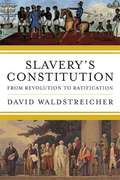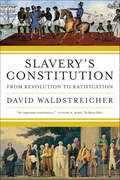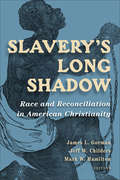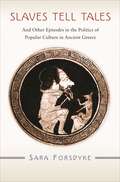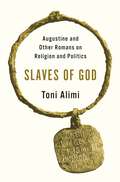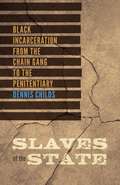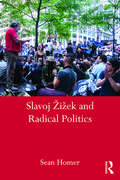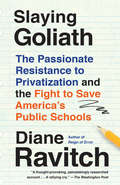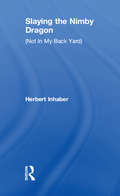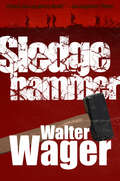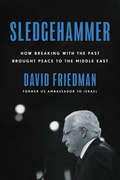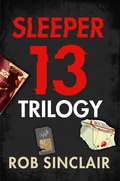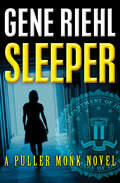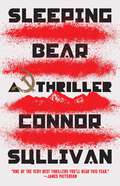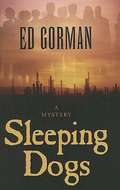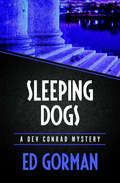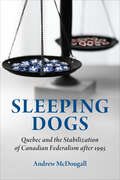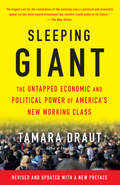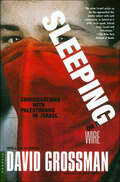- Table View
- List View
Slavery's Constitution From Revolution to Ratification: From Revolution to Ratification
by David WaldstreicherTaking on decades of received wisdom, David Waldstreicher has written the first book to recognize slavery’s place at the heart of the U.S. Constitution. Famously, the Constitution never mentions slavery. And yet, of its eighty-four clauses, six were directly concerned with slaves and the interests of their owners. Five other clauses had implications for slavery that were considered and debated by the delegates to the 1787 Constitutional Convention and the citizens of the states during ratification. This “peculiar institution” was not a moral blind spot for America’s otherwise enlightened framers, nor was it the expression of a mere economic interest. Slavery was as important to the making of the Constitution as the Constitution was to the survival of slavery. By tracing slavery from before the revolution, through the Constitution’s framing, and into the public debate that followed, Waldstreicher rigorously shows that slavery was not only actively discussed behind the closed and locked doors of the Constitutional Convention, but that it was also deftly woven into the Constitution itself. For one thing, slavery was central to the American economy, and since the document set the stage for a national economy, the Constitution could not avoid having implications for slavery. Even more, since the government defined sovereignty over individuals, as well as property in them, discussion of sovereignty led directly to debate over slavery’s place in the new republic. Finding meaning in silences that have long been ignored, Slavery’s Constitution is a vital and sorely needed contribution to the conversation about the origins, impact, and meaning of our nation’s founding document.
Slavery's Constitution: From Revolution to Ratification
by David WaldstreicherTaking on decades of received wisdom, David Waldstreicher has written the first book to recognize slavery's place at the heart of the U.S. Constitution. Famously, the Constitution never mentions slavery. And yet, of its eighty-four clauses, six were directly concerned with slaves and the interests of their owners. Five other clauses had implications for slavery that were considered and debated by the delegates to the 1787 Constitutional Convention and the citizens of the states during ratification. This "peculiar institution" was not a moral blind spot for America's otherwise enlightened framers, nor was it the expression of a mere economic interest. Slavery was as important to the making of the Constitution as the Constitution was to the survival of slavery.By tracing slavery from before the revolution, through the Constitution's framing, and into the public debate that followed, Waldstreicher rigorously shows that slavery was not only actively discussed behind the closed and locked doors of the Constitutional Convention, but that it was also deftly woven into the Constitution itself. For one thing, slavery was central to the American economy, and since the document set the stage for a national economy, the Constitution could not avoid having implications for slavery. Even more, since the government defined sovereignty over individuals, as well as property in them, discussion of sovereignty led directly to debate over slavery's place in the new republic.Finding meaning in silences that have long been ignored, Slavery's Constitution is a vital and sorely needed contribution to the conversation about the origins, impact, and meaning of our nation's founding document.
Slavery's Long Shadow: Race and Reconciliation in American Christianity
by James L. Gorman Jeff W. Childers Mark W. HamiltonHow interactions of race and religion have influenced unity and division in the church At the center of the story of American Christianity lies an integral connection between race relations and Christian unity. Despite claims that Jesus Christ transcends all racial barriers, the most segregated hour in America is still Sunday mornings when Christians gather for worship. In Slavery’s Long Shadow fourteen historians and other scholars examine how the sobering historical realities of race relations and Christianity have created both unity and division within American churches from the 1790s into the twenty-first century. The book’s three sections offer readers three different entry points into the conversation: major historical periods, case studies, and ways forward. Historians as well as Christians interested in racial reconciliation will find in this book both help for understanding the problem and hope for building a better future.Contributors:Tanya Smith BriceJoel A. BrownLawrence A. Q. BurnleyJeff W. ChildersWes CrawfordJames L. GormanRichard T. HughesLoretta HunnicuttChristopher R. HutsonKathy PulleyEdward J. RobinsonKamilah Hall SharpJerry TaylorD. Newell Williams
Slavery, Race, and Conquest in the Tropics
by Robert E. MaySlavery, Race, and Conquest in the Tropics challenges the way historians interpret the causes of the American Civil War. Using Abraham Lincoln and Stephen Douglas's famed rivalry as a prism, Robert E. May shows that when Lincoln and fellow Republicans opposed slavery in the West, they did so partly from evidence that slaveholders, with Douglas's assistance, planned to follow up successes in Kansas by bringing Cuba, Mexico, and Central America into the Union as slave states. A skeptic about 'Manifest Destiny', Lincoln opposed the war with Mexico, condemned Americans invading Latin America, and warned that Douglas's 'popular sovereignty' doctrine would unleash US slaveholders throughout Latin America. This book internationalizes America's showdown over slavery, shedding new light on the Lincoln-Douglas rivalry and Lincoln's Civil War scheme to resettle freed slaves in the tropics.
Slaves Tell Tales: And Other Episodes in the Politics of Popular Culture in Ancient Greece
by Sara ForsdykeMost studies of ancient Greek politics focus on formal institutions such as the political assembly and the law courts, and overlook the role that informal social practices played in the regulation of the political order. Sara Forsdyke argues, by contrast, that various forms of popular culture in ancient Greece--including festival revelry, oral storytelling, and popular forms of justice--were a vital medium for political expression and played an important role in the negotiation of relations between elites and masses, as well as masters and slaves, in the Greek city-states. Although these forms of social life are only poorly attested in the sources, Forsdyke suggests that Greek literature reveals traces of popular culture that can be further illuminated by comparison with later historical periods. By looking beyond institutional contexts, moreover, Forsdyke recovers the ways that groups that were excluded from the formal political sphere--especially women and slaves--participated in the process by which society was ordered. Forsdyke begins each chapter with an apparently marginal incident in Greek history--the worship of a dead slave by masters on Chios, the naming of Sicyon's civic divisions after lowly animals such as pigs and asses, and the riding of an adulteress on a donkey through the streets of Cyme--and shows how these episodes demonstrate the significance of informal social practices and discourses in the regulation and reproduction of the social order. The result is an original, fascinating, and enlightening new perspective on politics and popular culture in ancient Greece.
Slaves of God: Augustine and Other Romans on Religion and Politics
by Toni AlimiA provocative look at the central role of slavery in Augustine&’s religious, ethical, and political thoughtAugustine believed that slavery is permissible, but to understand why, we must situate him in his late antique Roman intellectual context. Slaves of God provides a major reassessment of this monumental figure in the Western religious and political tradition, tracing the remarkably close connections between Augustine&’s understanding of slavery and his broader thought.Augustine is most often read through the lens of Greek philosophy and the theology of Christian writers such as Paul and Ambrose, yet his debt to Roman thought is seldom appreciated. Toni Alimi reminds us that the author of Confessions and City of God was also a Roman citizen and argues that some of the thinkers who most significantly shaped his intellectual development were Romans such as Cicero, Seneca, Lactantius, and Varro—Romans who had much to say about slavery and its relationship to civic life. Alimi shows how Augustine, a keen and influential student of these figures, related chattel slavery and slavery to God, and sheds light on Augustinianism&’s complicity in Christianity&’s long entanglement with slavery.An illuminating work of scholarship, Slaves of God reveals how slavery was integral to Augustine&’s views about law, rule, accountability, and citizenship, and breaks new ground on the topic of slavery in late antique and medieval political thought.
Slaves of the State: Black Incarceration from the Chain Gang to the Penitentiary
by Dennis ChildsThe Thirteenth Amendment to the United States Constitution, passed in 1865, has long been viewed as a definitive break with the nation&’s past by abolishing slavery and ushering in an inexorable march toward black freedom. Slaves of the State presents a stunning counterhistory to this linear narrative of racial, social, and legal progress in America. Dennis Childs argues that the incarceration of black people and other historically repressed groups in chain gangs, peon camps, prison plantations, and penitentiaries represents a ghostly perpetuation of chattel slavery. He exposes how the Thirteenth Amendment&’s exception clause—allowing for enslavement as &“punishment for a crime&”—has inaugurated forms of racial capitalist misogynist incarceration that serve as haunting returns of conditions Africans endured in the barracoons and slave ship holds of the Middle Passage, on plantations, and in chattel slavery. Childs seeks out the historically muted voices of those entombed within terrorizing spaces such as the chain gang rolling cage and the modern solitary confinement cell, engaging the writings of Toni Morrison and Chester Himes as well as a broad range of archival materials, including landmark court cases, prison songs, and testimonies, reaching back to the birth of modern slave plantations such as Louisiana&’s &“Angola&” penitentiary. Slaves of the State paves the way for a new understanding of chattel slavery as a continuing social reality of U.S. empire—one resting at the very foundation of today&’s prison industrial complex that now holds more than 2.3 million people within the country&’s jails, prisons, and immigrant detention centers.
Slaves to Rome
by Myles LavanThis study in the language of Roman imperialism provides a provocative new perspective on the Roman imperial project. It highlights the prominence of the language of mastery and slavery in Roman descriptions of the conquest and subjection of the provinces. More broadly, it explores how Roman writers turn to paradigmatic modes of dependency familiar from everyday life - not just slavery but also clientage and childhood - in order to describe their authority over, and responsibilities to, the subject population of the provinces. It traces the relative importance of these different models for the imperial project across almost three centuries of Latin literature, from the middle of the first century BCE to the beginning of the third century CE.
Slavoj Žižek and Radical Politics
by Sean HomerIn this book, Sean Homer addresses Slavoj Žižek’s work in a specific political conjuncture, his political interventions in the Balkans. The charge of inconsistency and contradiction is frequently levelled at Žižek’s politics, a charge he openly embraces in the name of "pragmatism." Homer argues that his interventions in the Balkans expose the dangers of this pragmatism for the renewal of the Leftist politics that he calls for. The book assesses Žižek’s political interventions in so far as they advance his self-proclaimed "ruthlessly radical" aims about changing the world. Homer argues the Balkans can be seen as Žižek’s symptom, that element which does not fit into the system, but speaks its truth and reveals what the system cannot acknowledge about itself. In Part II Homer explores Žižek’s radicalism through his critique of Alain Badiou, arguing that Badiou’s "affirmationism" provides a firmer grounding for the renewal of the left than Žižek’s negative gesture analyzed in Part I. What distinguishes Žižek from the majority of the contemporary Left today is his valorization of violence; Homer tackles this issue head-on in relation to political violence in Greece. Finally, Homer defends the utopian impulse on the radical left against its Lacanian critics.
Slaying Goliath: The Passionate Resistance to Privatization and the Fight to Save America's Public Schools
by Diane RavitchFrom one of the foremost authorities on education and the history of education in the United States, "whistleblower extraordinaire" (The Wall Street Journal), former U.S. Assistant Secretary of Education, author of the best-selling Reign of Error ("fearless" --Jonathan Kozol, NYRB)--an impassioned, inspiring look at the ways in which parents, teachers, activists--citizens--are successfully fighting back to defeat the forces that are privatizing America's public schools.Diane Ravitch writes of those who have privatized the schools, the Disrupters, who believe America's schools should be run like businesses, with teachers incentivized with threats and bonuses, and schools that need to enter into the age of the gig economy in which children are treated like customers or products. She writes of the Koch brothers, the DeVos family, the Waltons (Walmart), Eli Broad, Bill Gates, Michael Bloomberg, Mark Zuckerberg, and many others, on the right and the left, as well as corporations, foundations, etc., intent on promoting the privatization of one of our most valued public institutions. Ravitch lays out, in extensive detail, the facts showing that the ideas put forth by school privateers have failed; that their promises of higher test scores have not come to pass; that the "great hope" of Common Core has been a dud. Arrayed against these forces, Ravitch writes of the volunteer army--"the Resisters"--that has sprung up from Seattle, Austin, and Denver, to Detroit, New Orleans, and Buffalo--parents, teachers, grandparents, students, bloggers, religious leaders, brave individuals, who, spurred on by conviction, courage, determination, and the power of ideas and passion, are fighting back to successfully keep alive their public schools.
Slaying the Nimby Dragon
by Herbert InhaberA mob scene erupted in April 1990 in the sleepy hamlet of Caneada, a small town on the northern edge of the Allegheny Mountains. In addition to riots and numerous arrests, six senior citizens, handcuffed to a heavy chain, formed a human barricade across the steel bridge spanning the Genesee River. Their purpose was to prevent the siting commission
Sledgehammer
by Walter Wager“A bust-em-up gutsy book” about an elite unit of soldiers, hand-picked for a mission behind enemy lines, on a quest for vengeance (Los Angeles Times). Sledgehammer is the code name for the operation of an elite OSS unit behind German lines during World War II. Five experts in guerrilla warfare are concealed under identities as a crusading journalist, a Hollywood stuntman, a professor of psychology, a money man for a major casino, and a billionaire bachelor. Their mission is clear. Their training has prepared them for anything. But when the journalist is murdered, his four friends change the plan to one single purpose: get revenge.
Sledgehammer: How Breaking with the Past Brought Peace to the Middle East
by David FriedmanThe Trump administration’s peace agreements in the Middle East were the greatest foreign policy accomplishment in decades. Now, for the first time, his ambassador to Israel explains how they pulled it off.Doing the same thing over and over and expecting different results is insanity. For decades, the U.S. State Department called it diplomacy.David Friedman was an outside candidate when President Trump appointed him U.S. ambassador to Israel. He took office to find U.S.-Israel policy stuck in stalemate. For years, accepted wisdom was that extensive experience and detailed knowledge of Middle Eastern history and culture were necessary to negotiate treaties. In truth, Friedman realized, all parties played on that accepted wisdom to stall—expecting to get a better deal further down the road.Tossing the State Department playbook aside and incorporating insights from his many years as a negotiator in the American private sector, Friedman and a small team with no prior diplomatic experience revamped American diplomacy to project “peace through strength.” He emphasized the importance of leverage, the key to any good negotiation. After painstaking, behind-the-scenes work, the Abraham Accords were signed: a historic series of peace deals between Israel and the five Muslim nations.In Sledgehammer, Friedman tells the true story of how the Abraham Accords came about. He takes us from the Oval Office to the highest echelons of power in the Middle East, putting us at the table during the intense negotiations that led to this historic breakthrough. The inside story of arguably the greatest achievement of the Trump Administration, Sledgehammer is an important, inspiring account of the hard, hopeful work necessary to bring long overdue—and lasting—peace to one of the most turbulent and tragic regions of the globe.
Sleeper 13 Trilogy: Sleeper 13, Fugitive 13 and Imposter 13
by Rob SinclairThe complete SLEEPER 13 trilogy from international bestselling author Rob SinclairSmuggled to the Middle East as a child. Trained as an elite insurgent. Forced to do things no one should, for a cause he didn't believe in. Aydin Torkal will break free and hunt the men who made him a monster, and bring down the terrorists who threaten global peace.'Perfect for spy thriller lovers and fans of I Am Pilgrim and Orphan X' - Goodreads reviewer'I could not put down this book' - Netgalley reviewer'Brilliant, gripping' - Netgalley reviewer'One of the most intense and engrossing thrillers of the last decade' - Amazon reviewer****************This Kindle boxset includes every book in the explosive trilogySLEEPER 13 - Smuggled to the Middle East as a child. Trained as an elite insurgent. Forced to do things no one should, for a cause he didn't believe in. On the eve of the deadliest coordinated attack the world has ever seen, Aydin Torkal finally makes his escape. He will break free and hunt down those who made him a monster. He will need to draw on all his training to survive.FUGITIVE 13 - Aydin Torkal is being hunted by international intelligence agencies and by the elite brotherhood he betrayed. He has lived the past year as a ghost. Until now. MI6 agent Rachel Cox is the only person who believes he is an ally, not an enemy. So when a coded message arrives from him, warning her not to trust her own colleagues, Rachel must choose between her career and the truth.IMPOSTER 13 - Now living a secret life in London, MI6 needs Aydin Torkal's help infiltrating a sinister new terrorist cell. In order to halt their deadly ambitions, he must convince the world's most dangerous terrorists that he's one of them. He must do it before the world suffers another deadly attack. And he must do it alone.Own the complete series now!
Sleeper 13 Trilogy: Sleeper 13, Fugitive 13 and Imposter 13
by Rob SinclairThe complete SLEEPER 13 trilogy from international bestselling author Rob SinclairSmuggled to the Middle East as a child. Trained as an elite insurgent. Forced to do things no one should, for a cause he didn't believe in. Aydin Torkal will break free and hunt the men who made him a monster, and bring down the terrorists who threaten global peace.'Perfect for spy thriller lovers and fans of I Am Pilgrim and Orphan X' - Goodreads reviewer'I could not put down this book' - Netgalley reviewer'Brilliant, gripping' - Netgalley reviewer'One of the most intense and engrossing thrillers of the last decade' - Amazon reviewer****************This Kindle boxset includes every book in the explosive trilogySLEEPER 13 - Smuggled to the Middle East as a child. Trained as an elite insurgent. Forced to do things no one should, for a cause he didn't believe in. On the eve of the deadliest coordinated attack the world has ever seen, Aydin Torkal finally makes his escape. He will break free and hunt down those who made him a monster. He will need to draw on all his training to survive.FUGITIVE 13 - Aydin Torkal is being hunted by international intelligence agencies and by the elite brotherhood he betrayed. He has lived the past year as a ghost. Until now. MI6 agent Rachel Cox is the only person who believes he is an ally, not an enemy. So when a coded message arrives from him, warning her not to trust her own colleagues, Rachel must choose between her career and the truth.IMPOSTER 13 - Now living a secret life in London, MI6 needs Aydin Torkal's help infiltrating a sinister new terrorist cell. In order to halt their deadly ambitions, he must convince the world's most dangerous terrorists that he's one of them. He must do it before the world suffers another deadly attack. And he must do it alone.Own the complete series now!
Sleeper: Quantico Rules And Sleeper (The Puller Monk Novels #2)
by Gene RiehlPraised by Harlan Coben as "a fresh new voice" in crime fiction, ex-FBI agent Gene Riehl takes readers into a secret, high-stakes world of counterintelligence and espionage in his 2nd suspense-packed Puller Monk thriller FBI agent Puller Monk has been called in to track down a Leonardo da Vinci masterpiece that was recently stolen from a private collector in Washington, DC. But the culprit isn't an ordinary thief; she's a sleeper terrorist--an American who was abducted as an infant, renamed Sung Kim by her North Korean captors, and trained in the deadliest of arts. The National Security Agency (NSA) wants Monk to catch her before she carries out her next diabolical mission. Working so deep undercover that even the FBI and Monk's girlfriend are kept in the dark, the rogue agent plunges into a game of cat and mouse that could cost him his life--and the lives of many others. But Monk never backs off from a case, and he has his own unorthodox methods of getting the job done. As he moves within the shadows, Monk becomes both hunter and prey in an endgame more chilling than anyone could imagine.
Sleeping Bear: A Thriller
by Connor Sullivan&“Sleeping Bear is…one of those rare novels that keeps getting better and better and better. Remember the author&’s name—Connor Sullivan.&” —James Patterson A former Army veteran seeking solitude in the Alaskan wilderness after her husband&’s death finds herself a pawn in a deadly game with Russia in this white-knuckled and &“heart-stopping thrill ride&” (Chris Hauty, author of Deep State).After her young husband&’s untimely death, Army veteran Cassie Gale decides to take a few days of solitude in the Alaskan wilderness before she starts her new job. But when she fails to show up on her first day and her dog is discovered injured at her wrecked campsite, her father knows that this is much more than a camping trip gone awry. As it turns out, Cassie&’s not the first person to disappear without a trace in Alaska&’s northern interior. Bears. Wolves. Avalanches. Frostbite. Starvation. There are many ways to die in here. But not all disappearances can be explained. Cassie&’s is one of them, along with a number of other outdoor enthusiasts who have vanished in recent years. Regaining consciousness in a Russian prison, Cassie finds herself trapped in a system designed to ensure that no one ever escapes alive. It will require all her grit and skills to survive. Meanwhile, her father rushes to outrun the clock, scouring thousands of acres, only to realize she&’s been taken by a nefarious adversary—one with the power of the Eastern Bloc behind it. Ties to his past life, one full of secrets, threaten to surface. He knows there&’s a price to be paid, but he&’s determined it won&’t be his daughter. Timely, electrifying, and perfect for fans of Vince Flynn and Brad Thor, &“Sleeping Bear clamps you in its jaws and doesn&’t let go. A fierce, relentless beast of a novel&” (Tess Gerritsen, New York Times bestselling author).
Sleeping Dogs
by Ed GormanDev Conrad is a paid consultant to congressmen and senators. But he is not prepared for Senator Warren's zipper problem. And when Warren's blackmailer is killed, things really begin to heat up.
Sleeping Dogs (The Dev Conrad Mysteries #1)
by Ed GormanA Chicago politico fights to protect his candidate from a murder investigation On the outside, Senator Warren Nichols's reelection campaign appears to be proceeding smoothly. But behind closed doors, chaos reigns. The senator's rabble-rousing opponent is gaining in the polls, and rumors of Nichols's womanizing threaten to end his political career forever. When his chief of staff quits and then commits suicide, turmoil threatens the Nichols camp. Only Dev Conrad can haul the senator back from the brink. A battle-hardened political consultant with a military background, Conrad finds the Nichols campaign in even worse shape than he imagined. A sleazy political operative has gotten his hands on a compromising tape of the senator, and he wants $1 million to keep it under wraps. When the blackmailer turns up murdered, Conrad must find the tape to keep his senator out of jail.
Sleeping Dogs: A Novel
by Tony VanderwarkerThe Pentagon has a dirty, little secret they've been keeping quiet for forty years. During the Cold War, a number of live H-bombs were jettisoned and lost around the country as a result of mishaps and mid-air collisions.A disgraced former Pentagon weapons expert, Howie Collyer, who blew the whistle on the unrecovered H-bombs and lost his job as a result, learns from a nurse in a VA hospital that one of her patients has vague recollections of being the pilot on a B-52 plane that jettisoned a nuke. Collyer teams up with the nurse to kidnap the man from the hospital in the hopes he will lead them to it. When the Pentagon learns Collyer is after the bomb, they try to stop him. But they are not alone. An al-Qaeda sleeper cell that has been keeping an eye on Collyer goes into action.A mad scramble ensues with the Pentagon, al-Qaeda, and Collyer all after the nuke. Will the al-Qaeda find it first and immolate half the Eastern Seaboard? Will the Pentagon succeed in putting a lid on their secret? Or will Howie Collyer expose the mess and vindicate himself?Inspired and written under the guidance of master storyteller, John Grisham, the plot of Sleeping Dogs takes amazing twists and turns before ending in an unexpected and spellbinding climax.
Sleeping Dogs: Quebec and the Stabilization of Canadian Federalism after 1995 (Political Development: Comparative Perspectives)
by Andrew McDougallWhat happened to the Quebec sovereignty movement after 1995? In Sleeping Dogs, Andrew McDougall reveals how a change in federalist strategy, combined with an improving political context, helped Canada stabilize its federal system and bury the "Quebec question" for the foreseeable future. The book identifies five potential reasons the Quebec sovereignty movement lost momentum and argues that all contributed to a political environment that benefited federalists. McDougall explores topics of elite accommodation, generational change, changing identity politics, economic globalization, and constitutional fatigue. He argues that Canada’s federalist political elites have capitalized on these developments to stabilize the country by dropping the national question – even when they might still hold very different visions of the Constitution. Building on "constitutional abeyance" theory, the author conceives of this strategic change as the restoration of a constitutional abeyance among federalist actors. Considering recent history in light of subsequent developments, Sleeping Dogs is a timely and important attempt to understand the evolving situation in Quebec and Canadian federalism.
Sleeping Giant: The Untapped Economic and Political Power of America's New Working Class
by Tamara DrautThere was a time when America’s working class was seen as the backbone of the American economy, having considerable political, economic, and moral authority. But the working class we have now—far more female and racially diverse and employed by the fast food, retail, health care, and other service industries—has been marginalized, if not ignored, by politicians and pundits. This is changing, swiftly and dramatically. Today’s working class is a sleeping giant. And as Tamara Draut makes abundantly clear, it is just now waking up to its untapped political power. Sleeping Giant is the first major examination of the new working class and the role it will play in our economic and political future. Blending moving individual narratives, historical background, and sophisticated analysis, Draut forcefully argues that this newly energized class is far along in the process of changing America for the better.Draut examines the legacy of exclusion based on race and gender that contributes to the invisibility of the new working class, despite their entwinement in everyone’s day-to-day life. No longer confined to the assembly line, today’s working class watches our children and cares for our parents. They park our cars, screen our luggage, clean our offices, and cook and serve our meals. They are us. With “Fight for $15” minimum-wage protests popping up throughout the country (and in some places winning) and economic inequality being recognized as one of the defining issues of our time, today’s working class will soon become impossible to ignore and foolish to dismiss. Sleeping Giant is the first book to tell the story of this extraordinary transformation in full and inspiring detail.From the Hardcover edition.
Sleeping on Jupiter
by Anuradha RoyLONGLISTED FOR THE MAN BOOKER PRIZE 2015A stark and unflinching novel by a spellbinding storyteller, about religion, love and violence in the modern world.A train stops at a railway station. A young woman jumps off. She has wild hair, sloppy clothes, a distracted air. She looks Indian, yet she is somehow not. The sudden violence of what happens next leaves the other passengers gasping.The train terminates at Jarmuli, a temple town by the sea. Here, among pilgrims, priests and ashrams, three old women disembark only to encounter the girl once again. What is someone like her doing in this remote corner, which attracts only worshippers?Over the next five days, the old women live out their long-planned dream of a holiday together; their temple guide finds ecstasy in forbidden love; and the girl is joined by a photographer battling his own demons.The full force of the evil and violence beneath the serene surface of the town becomes evident when their lives overlap and collide. Unexpected connections are revealed between devotion and violence, friendship and fear, as Jarmuli is revealed as a place with a long, dark past that transforms all who encounter it.
Sleeping on Jupiter: A Novel
by Anuradha RoyLONGLISTED FOR THE MAN BOOKER PRIZE 2015A stark and unflinching novel by a spellbinding storyteller, about religion, love and violence in the modern world.A train stops at a railway station. A young woman jumps off. She has wild hair, sloppy clothes, a distracted air. She looks Indian, yet she is somehow not. The sudden violence of what happens next leaves the other passengers gasping.The train terminates at Jarmuli, a temple town by the sea. Here, among pilgrims, priests and ashrams, three old women disembark only to encounter the girl once again. What is someone like her doing in this remote corner, which attracts only worshippers?Over the next five days, the old women live out their long-planned dream of a holiday together; their temple guide finds ecstasy in forbidden love; and the girl is joined by a photographer battling his own demons.The full force of the evil and violence beneath the serene surface of the town becomes evident when their lives overlap and collide. Unexpected connections are revealed between devotion and violence, friendship and fear, as Jarmuli is revealed as a place with a long, dark past that transforms all who encounter it.
Sleeping on a Wire: Conversations with Palestinians in Israel
by David GrossmanBased on conversations with Palestinians in Israel, David Grossman's Sleeping on a Wire, like The Yellow Wind, is essential reading for anyone trying to understand the Middle East today.Israel describes itself as a Jewish state. What, then, is the status of the one-fifth of its citizens who are not Jewish? Are they Israelis, or are they Palestinians? Or are they a people without a country? How will a Palestinian state—if it is established—influence the sense of belonging and identity of Palestinian Israeli citizens? "No other Israeli writer so far has approached this touchy subject with such compassion, or looked at it with, so to speak, bifocal eyes, Israeli and Palestinian." --Amos Elon, The New York Review of Books
